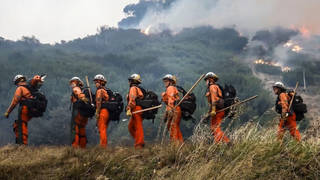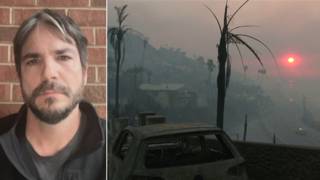
Related
Guests
- Kali Akunothe national organizer for the Malcolm X Grassroots Movement and organizer in the US solidarity effort with the struggle of the workers and people of Guadeloupe.
The financial crisis has had reverberations beyond the United States and Europe, with people taking to the streets in cities across the globe to protest rising wealth inequality and to call for economic and labor rights. Perhaps the most significant action took place in the French Caribbean, on the island of Guadeloupe. Amid rising costs of living, labor leaders in Guadeloupe led a forty-four-day general strike that closed down roads, schools, gas stations and public transportation. The strikers claimed a victory earlier this month with a plan to improve wages and living standards. [includes rush transcript]
Transcript
JUAN GONZALEZ: The financial crisis has had reverberations far beyond the United States and Europe, with people taking to the streets in cities across the globe to protest rising wealth inequality and to call for economic and labor rights. Perhaps the most significant action took place in the French Caribbean on the island of Guadeloupe. Labor leaders in Guadeloupe led a forty-four-day general strike that completely paralyzed the island. Starting on January 19th, workers revolted against the French government over the exorbitant cost of living by closing down roads, schools, gas stations and public transportation.
The strike was led by a coalition of union leaders called the LKP, an acronym in Creole that translates to the League Against Profiteering. They accused the ruling white business minority of exploiting the island’s black majority. While legally a full part of France and the European Union, Guadeloupe is one of the poorest parts of the national territory, with 23 percent unemployment and a high cost of living.
AMY GOODMAN: The strike has been described as the most significant in the island’s history. The six-week struggle saw one activist shot dead, hundreds of extra police deployed from mainland France. The strikers held out and claimed victory earlier this month with a detailed plan to improve wages and living standards on the island.
Meanwhile, on the nearby island of Martinique, a similar strike ended two weeks later, after officials signed an agreement that included salary increases for low-wage earners.
For more on all of this, we’re joined by Kali Akuno. He is the national organizer for the Malcolm X Grassroots Movement and organizer with the US solidarity effort with the struggle for the workers and people of Guadeloupe. He is joining us via video stream from New Orleans.
Kali, welcome to Democracy Now! Explain to us exactly what this struggle in Guadeloupe was about.
KALI AKUNO: Good morning, Amy.
The struggle was about the fundamental human rights of the people of Guadeloupe. The cost of living in Guadeloupe had been rising exponentially since kind of the escalation of the crisis, particularly around food prices and rents going up, beginning in 2007. And particularly the UGTG, the General Union of Workers in Guadeloupe, have been raising and agitating the government of Guadeloupe in France since 2007 to kind of increase the wages and ameliorate the living conditions of the people in Guadeloupe. That led to, in December of 2008, the first strike which happened, which preceded the general strike, which commenced in January and ended on March 5th in a great victory of the people of Guadeloupe. And I think it, as you mentioned, set a firm tone of struggle, I think, for international — you know, for people all over the world and workers all over the world.
But their conditions of unemployment, their conditions, particularly of the youth, of unemployment, the exclusion primarily of the majority of people from ownership in the island was a major concern. And it’s not over. Even though the — you know, there was an agreement on March 5th, many of the so-called — the employers’ association on the island are still refusing to pay the 100 euros that are part of the settlement demand. So there are still aspects of the strike which are ongoing.
And, of course, there’s the defense of Emile, who was one of the leaders of the strike. He’s been charged with a racial kind of defamation charge in France. But this is really an attack to kind of undermine the moral and legitimate basis of the strike itself and undermine the agreement, which France and the [inaudible] parties of Guadeloupe are very insistent on doing, primarily to keep it from spreading. It also spread to Reunion, and it’s now starting to have some blowback into France itself. So these are issues which are still kind of part of an ongoing process.
JUAN GONZALEZ: Yeah, Kali Akuno, I’d like to ask you about that, precisely, because this was a massive movement here that lasted for more than a month. It got virtually no press coverage here in the United States, but it did have an enormous impact in the Caribbean. What kind of impact did it have within France itself?
KALI AKUNO: Well, I mean, there was a general strike in France, a one-day general strike in France, recently, that put some tremendous pressure on Sarkozy and his government to transform and to deal with this crisis a bit different than how they’ve been dealing with it thus far, in terms of agreeing with the basic settlement aspects of the EU plan, which is going to be discussed at the G20 summit in London. But major sectors that came out — and over three million people came out in the general strike — major sectors are now pressing that we need the same basic kind of rights and concessions that were granted from the French government in Martinique and in Guadeloupe. Those need to be applied also in France. And so, a section of French workers are organizing now, to my understanding, to launch a general strike and to launch it on the example of what took place in Guadeloupe and stay out in the streets and, you know, disrupt business and disrupt the regular order of business, the exploitation on a day-to-day level, to extend that to France.
So this is something that myself and, I know, a lot of folks here who gave some solidarity to the struggle in Guadeloupe are really paying some close attention to, because it’s going to have a long-term impact on what happens in the Caribbean possession of France, Martinique and Guadeloupe and some of the other so-called overseas possessions, which are still basically colonies. So we’re looking at this very closely. And the impact it’s going to have, you know, on workers in Europe and ultimately here in the United States and throughout the world, we think will be pretty significant, given the nature of this crisis.
JUAN GONZALEZ: And why, particularly, did this develop in Guadeloupe? It reminds us a lot of the struggle that occurred in Mexico, the strike of the teachers there. What’s a particular reason why this island became a leader in the struggle?
KALI AKUNO: Well, number one, the General Union, the General Guadeloupan Trade Union, has been a very strong and militant union throughout most of its history. They’ve been very active in its international solidarity. They played a pretty significant role here in New Orleans in the tribunal that we held in August and September of 2007, which was looking and investigating into the various human rights abuses of the United States government. So, you know, they have a very internationalist outlook as part of their foundation. And the leadership that they gave to the struggle there, I think, you know, that’s kind of a fundamental thing.
But the material conditions which led to it, you know, the — Guadeloupe is a French overseas possession. Its economy is regulated in euros. It doesn’t have its own currency. And folks get paid in euros. And with the kind of escalating prices, particularly around food, starting in 2007, and in rents and in oil and gas, the living conditions of the majority of people deteriorate quickly.
In the militant tradition and the history of the UGTG, you know, they [inaudible] forward, they built a broad coalition of over forty-nine different unions and community organizations and popular organizations on the island. And, you know, they pressed, like I said, beginning in December, and tried to kind of meet some basic standards with the government, some basic compromises. When that wasn’t met, they did what I would say they had to do, you know, to restore some dignity to their lives and some balance in the — cohesion of where the economy stands on the global [inaudible] the government and press, you know, the private enterprises on the island for some justice. And they won, but like I said, it’s an ongoing struggle, and people should be very much aware [inaudible].
AMY GOODMAN: Very quickly, Kali Akuno, there were massive protests in the streets earlier this month in France and the biggest demonstration since Sarkozy’s election. And then, next week, the G20 is going to be meeting. Where do you think the significance of the Guadeloupe protest and victory fits into? And can it have any bearing on G20 and its blowback to France?
KALI AKUNO: I think it will have a major impact, Amy. You know, workers all over Europe that I’m in contact with are using it as a kind of a standard-bearer. And I think with the earlier victory in Bolivia with the constitutional referendum and also the victory that happened in Venezuela, this is one of the key early victories in this crisis I think people all over the world are looking to as an example.
AMY GOODMAN: Kali Akuno, thanks so much for being with us, national organizer for the Malcolm X Grassroots Movement, organizer with the US solidarity effort with the struggle of the workers and people of Guadeloupe. He was actually speaking to us by video stream from New Orleans.












Media Options